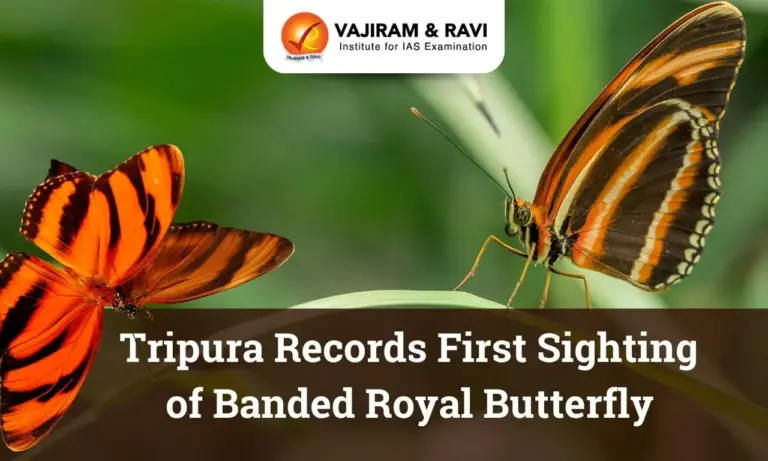About Banded Royal Butterfly:
- It is a species of lycaenid or blue butterfly found in parts of South and Southeast Asia.
- Scientific Name: Rachana jalindra
- Habitat:
- Found in forests, particularly near the Western Ghats, Northeast India, Sri Lanka, Myanmar, Thailand, and Malaysia.
- Prefers dense vegetation and can often be seen resting on leaves.
- There are three subspecies of Rachana jalindra found in India, including macantia, distributed from southwest India to Goa; R. j. tarpina, distributed in the Andamans; and R. j. indra, distributed from Orissa to lower West Bengal and Bangladesh.
- Presently the subspecies R. j. indra is recorded from Assam, Meghalaya, and Jharkhand.
- Appearance:
- Upper Side: Males have a deep purple or bluish sheen with dark brown borders, while females are more brownish with white markings.
- Under Side: Pale brown with distinct white bands running across the wings, giving it the “banded” appearance.
- It is legally protected under Schedule II of the Indian Wildlife (Protected) Act, 1972.
Key Facts about Sepahijala Wildlife Sanctuary (SWL):
- It is situated in the state of Tripura, 25 kilometers from the capital, Agartala.
- It spans an area of approximately 18.53 sq.km.
- It is divided into five sections, basically to segregate the different types of animals living here. They are the carnivore section, primate section, ungulate section, reptile section, and aviary section.
- Clouded Leopard National Park, established in 2007, is a part of SWL.
- It also has two natural lakes, namely Abasarika and Amrit Sagar.
- Vegetation: Moist deciduous forest
- Flora: The sanctuary has no less than 456 plant species; many kinds of bamboo and a variety of grasses and medicinal plants also grow in the sanctuary.
- Fauna:
- It is the habitat of different species of primates like Rhesus macaque, Pigtailed macaque, Capped langur, Spectacled langur, Slow loris and several other wild animals like Leopard, Clouded leopard, Jungle fowl, Civets, Barking, Deer, Wild pig, etc.
- The crab-eating mongoose (which was last seen in the 1930s) has also been revived here.
Q1: What is the Indian Wildlife (Protected) Act, 1972?
The Government enacted Wildlife (Protection) Act 1972 with the objective of effectively protecting the wildlife of this country and to control poaching, smuggling and illegal trade in wildlife and its derivatives. The Act was amended in January 2003 and punishment and penalty for offences under the Act have been made more stringent. The Ministry has proposed further amendments in the law by introducing more rigid measures to strengthen the Act. The objective is to provide protection to the listed endangered flora and fauna and ecologically important protected areas.
Source: TOI
Last updated on March, 2026
→ UPSC Notification 2026 is now out on the official website at upsconline.nic.in.
→ UPSC IFoS Notification 2026 is now out on the official website at upsconline.nic.in.
→ UPSC Calendar 2026 has been released.
→ UPSC Final Result 2025 is expected to be released soon.
→ UPSC will release the UPSC Toppers List 2025 with the Civil Services final result on its official website.
→ Check out the latest UPSC Syllabus 2026 here.
→ Join Vajiram & Ravi’s Interview Guidance Programme for expert help to crack your final UPSC stage.
→ UPSC Mains Result 2025 is now out.
→ UPSC Prelims 2026 will be conducted on 24th May, 2026 & UPSC Mains 2026 will be conducted on 21st August 2026.
→ The UPSC Selection Process is of 3 stages-Prelims, Mains and Interview.
→ Prepare effectively with Vajiram & Ravi’s UPSC Prelims Test Series 2026 featuring full-length mock tests, detailed solutions, and performance analysis.
→ Enroll in Vajiram & Ravi’s UPSC Mains Test Series 2026 for structured answer writing practice, expert evaluation, and exam-oriented feedback.
→ Join Vajiram & Ravi’s Best UPSC Mentorship Program for personalized guidance, strategy planning, and one-to-one support from experienced mentors.
→ Check UPSC Marksheet 2025 Here.
→ UPSC Toppers List 2024 is released now. Shakti Dubey is UPSC AIR 1 2024 Topper.
→ Also check Best UPSC Coaching in India
Tags: banded royal butterfly upsc current affairs upsc prelims article upsc prelims current affairs


















